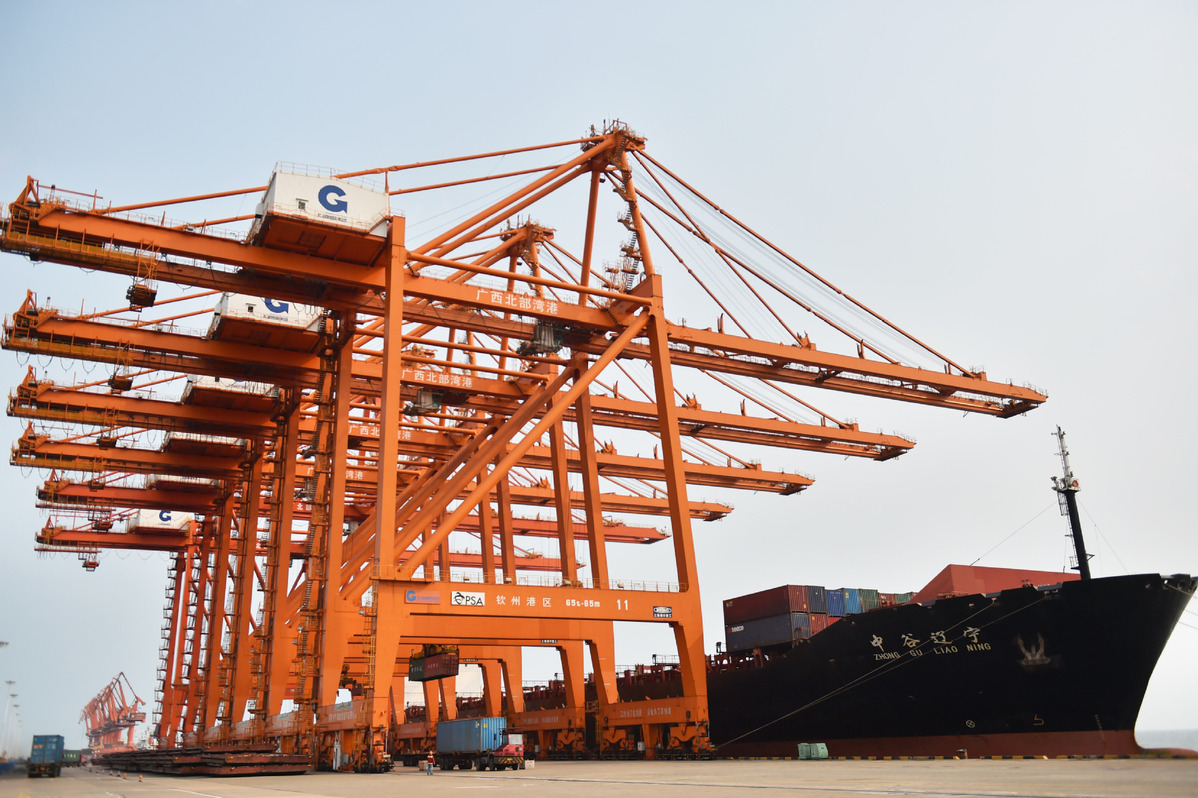
A cargo ship docks at Qinzhou Port in China-ASEAN Free Trade Area in Qinzhou, Guangxi Zhuang autonomous region. [Photo/Xinhua]
The US government's decision to impose punitive tariffs on major trading partners will impact Southeast Asia, and the region's export-dependent economy could face long-term repercussions, analysts said.
While ASEAN members will not be directly hit by the hikes, analysts said the United States slapping higher tariffs on Canada, China, and Mexico could slow down global trade, reducing export revenues and investment inflows for ASEAN.
US President Donald Trump signed an order on Feb 1 imposing a 25 percent tariff on imports from Canada and Mexico and an additional 10 percent on imported Chinese goods. He also said that imposing additional tariffs against the European Union "will definitely happen" but did not give a timeline.
Trump paused the planned tariff hikes against Mexico and Canada for a month but the levies against China took effect on Tuesday.
China has filed a complaint against the US at the World Trade Organization for seriously violating its rules. China will also impose additional tariffs ranging from 10 to 15 percent on select US products and launch an anti-monopoly probe into Google.
Michael Ricafort, chief economist of Rizal Commercial Banking Corp in Manila, said Trump's protectionist trade policies "could lead to retaliatory trade wars that could slow down global trade, investments, and other business and economic activities".
Wan Suhaimie Wan Mohd Saidie, head of economic research at Malaysia's Kenanga Investment Bank Berhad, said "broader US protectionism "may dampen the demand for ASEAN's exports, which account for about 60 percent of regional GDP.
It could also lead to currency volatility and penalize ASEAN countries perceived as transshipment hubs, he added.
"For ASEAN, the tariffs present a dual reality," Wan Suhaimie said, noting that Vietnam, Malaysia, and Thailand have emerged as alternative hubs for electronics, textiles, and semiconductor manufacturing, attracting investments from multinational firms.
Deep integration
"But the region's deep integration with China, where 15 to 20 percent of ASEAN exports are intermediate goods for Chinese manufacturing, leaves it exposed to collateral damage if China's export engine slows," Wan Suhaimie said.
Tauhid Ahmad, executive director of the Institute for Development Economics and Finance in Jakarta, Indonesia, said tariff hikes may weigh on China's economy, cutting demand for products imported from ASEAN. China is ASEAN's largest trade partner.
ASEAN-China supply chains "will be disrupted", Tauhid said. For example, he said reduced Chinese demand for nickel and coal imports could lead to oversupply in Indonesia as China is the biggest market for Indonesian commodities.
Tauhid said intra-ASEAN trade needs to be strengthened to counter the impact of Trump's policy.
As a regional bloc, ASEAN has not yet issued a statement on the tariff hikes.
However, Malaysian Prime Minister Anwar Ibrahim, this year's rotating chair of ASEAN, said Malaysia "must take proactive steps … to aggressively open a wider network of trading partners".
Anwar told parliament on Feb 4 that the government is still negotiating with the US but at the same time will actively build trade relations with other countries, including Brazil, China, and Russia.
Trump's move to raise tariffs was in line with his campaign promise to boost the US manufacturing sector and protect jobs.
Leonardus Jegho in Jakarta contributed to this story.